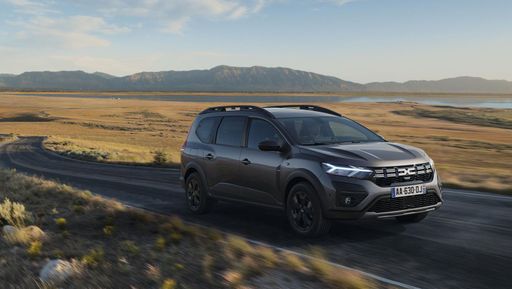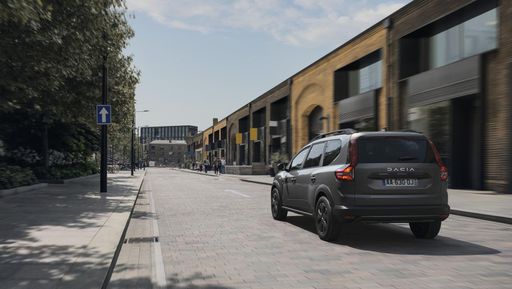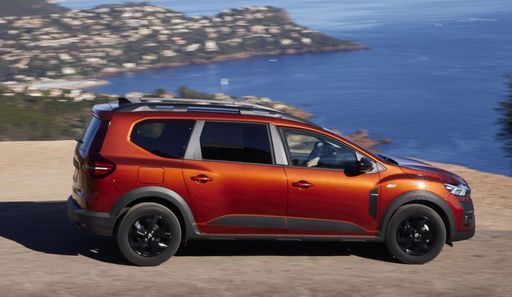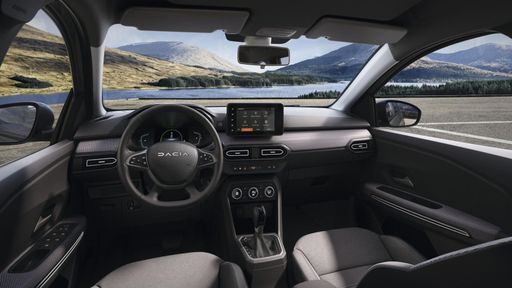Dacia Jogger vs Renault Express - Differences and prices compared
Compare performance (158 HP vs 102 HP), boot space and price (15400 £ vs 17100 £ ) at a glance. Find out which car is the better choice for you – Dacia Jogger or Renault Express?
Costs and Efficiency:
When it comes to price and running costs, the biggest differences usually appear. This is often where you see which car fits your budget better in the long run.
Dacia Jogger has a a bit advantage in terms of price – it starts at 15400 £ , while the Renault Express costs 17100 £ . That’s a price difference of around 1705 £.
Fuel consumption also shows a difference: Dacia Jogger manages with 4.50 L and is therefore barely noticeable more efficient than the Renault Express with 4.60 L. The difference is about 0.10 L per 100 km.
Engine and Performance:
Power, torque and acceleration say a lot about how a car feels on the road. This is where you see which model delivers more driving dynamics.
When it comes to engine power, the Dacia Jogger has a clearly perceptible edge – offering 158 HP compared to 102 HP. That’s roughly 56 HP more horsepower.
In acceleration from 0 to 100 km/h, the Dacia Jogger is noticeable quicker – completing the sprint in 8.90 s, while the Renault Express takes 11.90 s. That’s about 3 s faster.
There’s also a difference in torque: Renault Express pulls to a small extent stronger with 240 Nm compared to 200 Nm. That’s about 40 Nm difference.
Space and Everyday Use:
Cabin size, boot volume and payload all play a role in everyday practicality. Here, comfort and flexibility make the difference.
Seats: Dacia Jogger offers clearly more seating capacity – 7 vs 2.
In curb weight, Dacia Jogger is hardly perceptible lighter – 1268 kg compared to 1296 kg. The difference is around 28 kg.
When it comes to payload, Renault Express noticeable takes the win – 700 kg compared to 559 kg. That’s a difference of about 141 kg.
Who wins the race in the data check?
The Dacia Jogger sits well ahead of its rival in the objective data comparison.
This result only shows which model scores more points on paper – not which of the two cars feels right for you.
Costs and Consumption
View detailed analysis
Engine and Performance
View detailed analysis
Dimensions and Body
View detailed analysis

Dacia Jogger
Dacia Jogger
The Dacia Jogger is a no-nonsense family mover that stretches the idea of value with cavernous practicality and flexible space, perfect for buyers who need a sensible, everyday Swiss Army knife on wheels. It doesn’t try to be glamorous — instead it wins hearts with cheerful thrift, durable materials and honest engineering, giving you useful transport without the pretence.
details



Renault Express
The Renault Express is a no-nonsense city van that pairs clever packaging and practical cargo space with an easy-to-drive, fuss-free character. Built for small businesses and active families, it delivers rugged reliability and low running costs without pretension — a sensible workhorse with a wink.
detailsCosts and Consumption |
|
|---|---|
|
Price
15400 - 23500 £
|
Price
17100 - 19500 £
|
|
Consumption L/100km
4.5 - 7.6 L
|
Consumption L/100km
4.6 - 6.6 L
|
|
Consumption kWh/100km
-
|
Consumption kWh/100km
-
|
|
Electric Range
-
|
Electric Range
-
|
|
Battery Capacity
-
|
Battery Capacity
-
|
|
co2
103 - 138 g/km
|
co2
121 - 149 g/km
|
|
Fuel tank capacity
-
|
Fuel tank capacity
50 L
|
Dimensions and Body |
|
|---|---|
|
Body Type
MPV
|
Body Type
Cargo Van
|
|
Seats
5 - 7
|
Seats
2
|
|
Doors
-
|
Doors
4
|
|
Curb weight
1268 - 1463 kg
|
Curb weight
1296 - 1390 kg
|
|
Trunk capacity
160 - 607 L
|
Trunk capacity
-
|
|
Length
-
|
Length
4393 mm
|
|
Width
1784 mm
|
Width
1775 mm
|
|
Height
-
|
Height
1811 mm
|
|
Max trunk capacity
-
|
Max trunk capacity
3300 L
|
|
Payload
384 - 559 kg
|
Payload
575 - 700 kg
|
Engine and Performance |
|
|---|---|
|
Engine Type
Petrol, Full Hybrid, LPG
|
Engine Type
Diesel, Petrol
|
|
Transmission
Manuel, Automatic
|
Transmission
Manuel
|
|
Transmission Detail
Manual Gearbox, Automatic Gearbox, Dual-Clutch Automatic
|
Transmission Detail
Manual Gearbox
|
|
Drive Type
Front-Wheel Drive
|
Drive Type
Front-Wheel Drive
|
|
Power HP
110 - 158 HP
|
Power HP
75 - 102 HP
|
|
Acceleration 0-100km/h
8.9 - 12 s
|
Acceleration 0-100km/h
11.9 - 16.3 s
|
|
Max Speed
-
|
Max Speed
100 - 167 km/h
|
|
Torque
190 - 200 Nm
|
Torque
200 - 240 Nm
|
|
Number of Cylinders
3 - 4
|
Number of Cylinders
4
|
|
Power kW
81 - 116 kW
|
Power kW
55 - 75 kW
|
|
Engine capacity
999 - 1789 cm3
|
Engine capacity
1332 - 1461 cm3
|
General |
|
|---|---|
|
Model Year
2025
|
Model Year
2021
|
|
CO2 Efficiency Class
D, E, C
|
CO2 Efficiency Class
D, E
|
|
Brand
Dacia
|
Brand
Renault
|
What drivetrain options does the Dacia Jogger have?
The Dacia Jogger is offered with Front-Wheel Drive.
